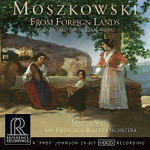|
Back
09/01/2016
“From Foreign Lands”
Moritz Moszkowski: Fackeltanz, Opus 51 – Aus aller Herren Länder, Opus 23 – Habanera, Opus 65, N° 3 – Près du berceau, Opus 58, N° 3 – Six airs de ballet, Opus 56 – Gondoliera, Opus 41 (orch. O. Langey) – Spanische Tänze, Opus 12 (orch. P. Scharwenka and V. Frank)
San Francisco Ballet Orchestra, Martin West (Conductor)
Recording: Skywalker Sound, a Lucasfilm Ltd. Company, Marin County, California (March 4-5, 2014) – 72’45
Reference Recordings # RR-138 – Booklet in English (Distributed by Naxos of America)

   
Though best known for his uplifting salon music and amazing perspicacity within piano music for 4-hands, Moritz Moszkowski also contributed to virtually every classical music category. Despite the scantily captured depth and breadth [of music], Reference Recordings aids in erasing the paucity of collections by introducing us to the delectability of From Foreign Lands. Moszkowski’s mastering of highly ornamental, approachable music without trivial fanfare is securely tethered under the confident leadership of San Francisco Ballet Orchestra’s (SFBO) Martin West...the CD couldn’t be in better hands.
If there’s a puzzlement pertaining to the CD’s title, From Foreign Lands, the answer is readily available: this spotlighted amalgam of divertissement de ballet takes an innocently humoristic approach towards danceable movements gleaned from various European cultures. Moszkowksi had a penchant for seasoning his music without stern contemplation, as if merely ‘flying’ from country-to-country in an anthropological Jules Verne bubbly interface. Each of the selections (consisting of Russian, Spanish, German, Polish, Italian and Hungarian) brings to the table its own character of scintillating spark and affectionate magnetism. Alexei Ratmansky was commissioned in 2013 to choreograph a new ballet given this Moszkowski foundation. Furthermore, his journey discovered a relentless, uninhibited fluidity to ballet through Moritz Moszkowski’s limpid notes and effervescent dynamo. The entire souvenir blushes with richly woven West orchestration. Woodwinds are particularly sparkly. Even though all the Opus’ six subsets are rendered delightful, personally, the Tarentelle italienne strikingly stands out with its uncannily musical parlance suggesting Glazunov imagery and the endearing Raymonda (1898) and to lesser extent, The Seasons (1900.)
Encouraged by Franz Liszt’s composition of the same name, Moszkowski’s own Gondoliera pleasantly rolls along in a barcarolle-like manner via an entrée of flouncy woodwinds and stringed remarks. Though Italian-esque in nature, there’s stronger Middle Eastern reminders of Thomas Moore’s Lalla Roukh and the ballet music by Anton Rubinstein created for his opera, Feramors (1863.) Distant yet sapid.
Favor surrounded many a “Spanish” theme undertaken by Moszkowski, and the Spanish Dances are no exception. If one feels transported into Minkus’ Don Quixote (1869) in the “N° 1” composition, it is with just cause. But the case can be made that Moszkowski errs on a heavier Spanish delineation: subsequent “numbers” have a weightier Russian tinge. Though delightful enough, they bring with it a grander grounding of understated seriousness. West’s discernment is polished and piquant.
If a berceuse elicits contentment and mollifying extenuations, then Moszkowski’s own portrayal of By the Cradle will come as a whimsical surprise. The piece conjures more of an American art-deco élan with an exceptionally quick tempo. The pacing is charming, almost eliciting that of Fauré’s Dolly Suites (1893-1896), yet there is a degree of childish frivolity and carefree complexion. Grand.
We turn to the swaggering seductive 2/4 rhythms contained in the Habanera. Aided by the snappy tambourine and Sara Voynow’s lilting harp glissandos, Martin West’s orchestral punctuations are vivacious with attentive tempo gradations. This contradanza habanera could be easily paired alongside many a work by Louis Moreau Gottschalk with its saucy Creole-derived brio…meticulously pristine.
The other prominent piece on this CD is a Moszkowski musical creation based on the literary work by Christian Dietrich Grabbe (1801-1836.) Though Grabbe had the misfortune of all his works turning south, this didn’t prevent Moritz Moszkowski from interpreting the writer’s work that commingled Mozart and Goethe. Six airs de ballet is a treat unto itself. There is a sense of sitting back and being bathed inside the piece without expected forcefulness: the music ‘tells’, the music ‘swells’, the music ‘compels.’ SFBO’s strings have a lilting and uplifting melodic bounce, helping to move the storyline along with a convincing feel as the music jumps from movement to movement. Woodwinds are at their finest inside this Moszkowski selection.
Keith O. Johnson again masters the sound to create a joyful journey into a man and his soul that, until this time, has been funneled into virtual obscurity. Late Romantic era ballet lovers will find this Reference Recordings irrepressibly engaging.
Christie Grimstad
|